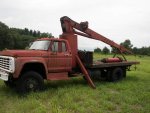peakbagger
Well-known member
- 734
- 360
- 63
- Location
- northern nh
I have seen comments on another forum regarding the hydraulics for SEEs being almost useless in extreme cold weather as the poster's SEEs came from down south and the fluid was too thick. Extreme cold weather in this case was in the -10 to -30 F range. I have seen the Technical Service hints about exercising the hydraulics in cold weather but its sound like that even has its limits. My SEE is parked for this winter due mostly to it getting in the way of snowplowing and no interest on my part to expose it to the nasty deicing chemicals used these days on the roads. I do at some point expect it will get used in the winter.
The question in my mind is should we be looking at something other than regular hydraulic fluid or engine oil for the SEE hydraulics?. I have had very good luck on regular vehicles using synthetic motor oil to make them turn over quicker in the winter as the viscosity of synthetic is far less impacted by temperature (it pours readily compared to regular oil in cold temps which pours like molasses). I wonder if switching to synthetic hydraulic fluid will have the same benefits?. Synthetics used to get blamed for increased engine oil leaks but I don't hear that as often. Curious how the old seals in system would adapt to it?
The question in my mind is should we be looking at something other than regular hydraulic fluid or engine oil for the SEE hydraulics?. I have had very good luck on regular vehicles using synthetic motor oil to make them turn over quicker in the winter as the viscosity of synthetic is far less impacted by temperature (it pours readily compared to regular oil in cold temps which pours like molasses). I wonder if switching to synthetic hydraulic fluid will have the same benefits?. Synthetics used to get blamed for increased engine oil leaks but I don't hear that as often. Curious how the old seals in system would adapt to it?



